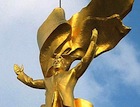 The biggest instability facing the region's dictators is the lack of any mechanism to succeed them
The biggest instability facing the region's dictators is the lack of any mechanism to succeed them
FAR from being at the heart of a happening continent, for much of modern times Central Asia stagnated on the periphery. Now, 20 years after breaking from the Soviet Union, things are changing for the "Stans". For one thing, huge and growing quantities of oil and gas are being uncovered. Seven-tenths of all the increase in oil output outside OPEC is coming from Central Asia. Led by Kazakhstan, an energy boom is under way.
Partly because of that, pipelines, roads and railways are reshaping the continent. A pipeline opened in 2009 that runs for 7,000km (4,400 miles) from gasfields in Turkmenistan to energy-hungry China. Railway plans are ambitious. China's schemes would mean that by 2025 a Shanghai resident could reach his tailor in London's Savile Row by train in two days.
The "central" is being put back into Central Asia. East-west links are forming between Europe and East Asia which may one day knit the Eurasian land mass together. Some, notably America's secretary of state, Hillary Clinton, talk of the north-south possibilities too. America will need a new regional policy once it pulls its troops out of Afghanistan, and Mrs Clinton's "New Silk Road" conjures visions of Turkmenistan piping gas to India and the markets of Astana groaning with Afghan fruit.
It is an attractive prospect, but not, at present, a realistic one. It would be crazy to put a pipeline through unstable Afghanistan. Nor has the Silk Road ever flourished without Iran's participation, something America is hardly likely to promote. As far as Central Asian rulers see it, Afghanistan's chief exports are militant Islam and drugs.
A greater danger still lies in Central Asia's domestic politics, in which change has been regrettably absent. With the exception of democratic Kyrgyzstan, where recent bloodshed hardly inspires confidence, Central Asia is run by ex-Soviet strongmen. Islam Karimov and Nursultan Nazarbayev have ruled Uzbekistan and Kazakhstan respectively since 1989, and Emomali Rakhmon has run Tajikistan since 1992. Gurbanguly Berdymukhamedov is a spring chicken, ruling Turkmenistan only since 2006. But he takes after his late predecessor, who had a gold statue of himself revolve to face the sun.
All these men, who dislike each other, have rigged elections, muzzled the media and gone after opponents. The most populous country, Uzbekistan, is perhaps the most repressive. Torture is widespread. In 2005 in Andijan, Uzbek soldiers fired on protesters, killing hundreds if not thousands of them. For a mix of secrecy and repression, however, Turkmenistan takes the biscuit. In July a lethal and suspicious explosion at an ammunition dump outside the capital, Ashgabat, was not reported within the country.
The secular strongmen fear social instability and militant Islam. But conflating ordinary piety with extremism risks bringing into existence the very thing they fear. Meanwhile, nepotism flourishes, stifling growth and creating inequalities. Political energies are chiefly spent securing the interests of immensely wealthy ruling families and a narrow group of oligarchs around them—none wealthier than Kazakhstan's (see article). Even as they solicit foreign investment, the elites put their own money and mistresses in London or Zurich. Further down the governing apparatus, Soviet habits die hard. One Western adviser calls Kazakhstan's tax and customs "officially sanctioned rackets", while the judiciary is up for sale. And Kazakhstan is Central Asia's most fragrant economy.
Stop fawning
Central Asia, thus, is not as stable as it seems. It might not take much—a powerful earthquake ineptly handled, growing protests by the dispossessed or, especially, a bungled succession—for the brittleness of these nasty, brutish and long regimes to show. Russia and China, competing for energy supplies, will not point this out to autocrats. But European governments should stop letting Central Asian dictators off the hook.
They could start in Kazakhstan, by far the most open place. Mr Nazarbayev spends fortunes on having Western public-relations firms, lobbyists and a former British prime minister, Tony Blair, burnish his image. Britain's Prince Andrew has been far too friendly with Central Asian dictators as well. Europeans would do better by pointing out that Mr Nazarbayev's image would shine brighter if he paved the way for a more plural politics—and for a successor who is not one of his family or from his circle of cronies. They should do this before stability suddenly turns to brittleness.
www.economist.com




